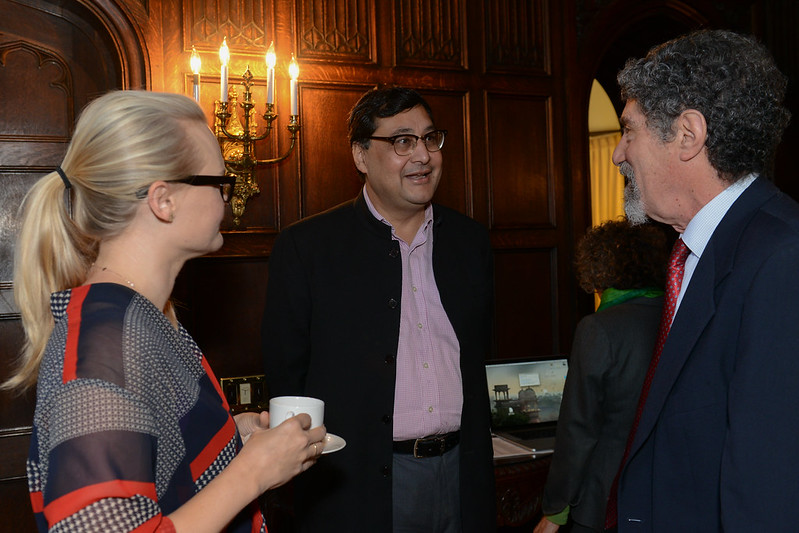The Trans-Pacific Partnership, or TPP, is a controversial proposed trade agreement that has garnered much of the world’s attention. If passed, the TPP would unite the United States, China, Japan and other Pacific Rim nations in a common free-trade environment.
Less discussed, however, is a parallel high-profile transnational trade agreement being examined as an alternative—the Transatlantic Trade and Investment Partnership, or TTIP. If passed, the TTIP would represent the largest economic relationship in the world by connecting the United States and the European Union in a standardized trade and investment environment.
On October 8th, Ambassador David O’Sullivan, Head of the EU Delegation to the United States, gave a keynote speech at Boston University’s Center for the Study of Europe on TTIP negotiations and the context in which they take place, based on his direct involvement in these talks. Speaking from his extensive background in economics and his substantial knowledge of EU social and employment policy as a diplomat, O’Sullivan spoke in favor of the TTIP.
“Trade is a better creator of wealth than anything else,” O’Sullivan explained. “No country in history has gone from poverty to wealth without trade.” Speaking specifically to the benefits of strengthening the trade environment between the United States and the European Union, O’Sullivan pointed out that the two bodies are undoubtedly intertwined—between them, they account for nearly half of the global GDP. “We are each more heavily invested in each other than either of us is in anyone else. American companies make more money in profit from Belgium than they do from China,” remarked O’Sullivan.
Not only did O’Sullivan highlight potential benefits from the agreement, he also addressed some of the concerns posed about lowering regulatory standards and compromises to health and safety. “When looking at trade agreements like the TTIP, of course there will be human and social consequences, and established economic actors will be disrupted. But trying to stop trade will make people poorer,” argued O’Sullivan.
Following O’Sullivan’s keynote speech were Dr. Tereza Novotna, a BU alum and a FNRS post-doctoral researcher at the Institute for European Studies at the Université libre de Bruxelles, and Prof. Roberto Dominguez of Suffolk University, who both discussed the geopolitical and broader context of the TTIP. Novotna’s presentation, “EU Institutions, Member States and TTIP Negotiations: The Balance of Power,” focused on the fact that although TTIP is in fact an economic agreement and will be judged on its economic merit, it is also a political and geopolitical agreement that has many more significant effects beyond the economics. “It, in a way, puts transatlantic relations back on the agenda of both sides of the Atlantic,” explains Novotna. Novotna claims that TTIP is especially important for the europeans, who were quite worried about the United States pivoting and trading with Asia (under the TPP). These worries stemmed from “security reasons and economic reasons,” as Novotna explains, but the most important impact of TTIP in transatlantic geopolitics would be uniting the European Union and the United States.
Professor Dominguez’s talk titled, “Implications of TTIP for the Wider World: Views from Latin America,” presented three general assumptions made about international trade negotiations in general based on the surveillance of those negotiations over time. The first assumption that Dominguez presents is that global trade negotiations have reached a stalemate, and that stalemate was made worse by the 2008 financial crisis. Assuming this stalemate to be true, it is also true that there is an alternative. “That alternative is mega-negotiations,” explains Dominguez—including the TTIP. The second assumption was that free trade reproduces economic growth. Since this is a generally observed trend, Dominguez argues that the debate comes about surrounding how to send messages of that growth to the public. “The growth will come,” says Dominguez, “but it is also true that there will be problems with jobs and job losses, and that’s where the debate starts.” The third assumption is that economic actors are not waiting for the conclusion of negotiations. “They are already acting in many different ways,” claims Dominguez, “from civil society to multinational companies.”
The second panel of conversationalists included Professor Michelle Egan of American University, Professor Fernanda Nicola of American University, and Professor Kaija Schilde of Boston University’s own Pardee School of Global Studies, discussing trade implications, sectors, and issues. Professor Egan’s talk was titled “Reframing Regulatory Cooperation under TTIP,” and focused on placing TTIP in context. Egan explains how times have changed in terms of trade agreements. “Earlier trade agreements were asymmetric, between a larger and a smaller trade partner.” Now, however, we are witnessing the emergence of mega trade agreements like TPP and TTIP. Egan also mentions that expectations are high for trade—when designing trade policies, we have grown to expect these policies to balance three main goals, efficiency, legitimacy, and political expediency.
Professor Schilde’s talk, “Possibilities for and Challenges to Defense Markets,” claims that TTIP would have positive externalities for the transatlantic relationship. Schilde goes on to express that she believes TTIP will never include defense markets, even if there is logic and a rationale about why it should. “In contrast to many other globalizing sectors,” explains Schilde, “there has been increasing interdependence between defense industries and their governments especially on the United States side, but increasingly on the European side.” This interdependency only intensifies over time, and also intensifies during economic downturns, leading Schilde to conclude that defense capability planning, specifically research and development, costs have been outsourced to industries.
Bringing legal expertise to the table, Professor Fernanda Nicola’s talk, “Transformative ISDS: The Constitutional Dimension of Investor-State Arbitration,” touched upon the controversial relationship between TTIP and the ISDS (investor-state dispute settlement). The ISDS is a neutral international arbitration procedure that aims to provide an impartial, law-based approach to resolve conflict. Recently, the European Parliament adopted a resolution supporting TTIP, but only under the condition that the current investor-state dispute settlement (ISDS) mechanism be replaced by another system.
Daniela Caruso brilliantly closed the conversation with remarks about justice. Directly expounding upon and challenging ambassador O’Sullivan’s talk, Caruso highlighted and stressed the importance for justice in TTIP negotiations. While O’Sullivan’s argument was that TTIP negotiations are a truly, nicely democratic process as open as possible, Caruso explained that, through the talks of all the panelists, it is much more complicated than that. Caruso points to the apparent simplicity of O’Sullivan’s language. “If you hear the ambassador speak, rationality is on one side of the commission, and on the other side, we have fear and anxiety. This is just too simple to be true.” Caruso urged the audience to take apart his vision of rationality and democracy and drew our attention to the production of knowledge. “Three quarters of the Czech don’t know what TTIP is, but yet, they’re the country who least opposes it.” Caruso also provides input from her law background in talking about democratic justice. “Often what looks like democracy, what looks like thick input, is actually very thin input. And that’s not what I would call democracy.” Caruso also explains that O’Sullivan’s idea that waiting before taking action isn’t a reliable option. “Waiting for the problem to surface before worrying about it simply doesn’t work in a democracy,” details Caruso. “You have to raise the possibility of problems even before the problems are fully documented or you will not document them. In fact, by the time you document them, the harm will be done.”
Caruso likens this to TTIP by explaining how, while the European Union and the United States will profit, others will suffer and be forced to devise their own strategies. “There is no mechanism of compensation that is built within the TTIP which considers the externalities that TTIP is going to generate on other countries.” Caruso points to Africa, naming Libya, Morocco, and Algeria (who was tremendously hit by the trade deviation effects of setting up the European Union). “Worrying about them through trade will not just be a gesture of altruism,” says Caruso. “It should be part and parcel of setting up a deal that will for sure generate predictable examples of trade deviation.” Lastly, Caruso tackles the common language that the EU and the U.S. have embraced about balancing and proportionality. “The way we mention justice is that yes, of course we will consider the interest of trade, but there will be many other counter interests that will be on the table at any point of these conversations, and they will balance [justice]. We think we have given enough homage to the other interests. Balancing is the beginning of the discussion, not the conclusion.” Caruso’s powerful call for justice may have capped off the Center for the Study of Europe’s panel discussion in the Castle, but she also provided listeners with enough thought-provoking challenges to ensure the conversation will continue.
By Toria Rainey ‘18. Re-blogged from the Center for the Study of Europe.

